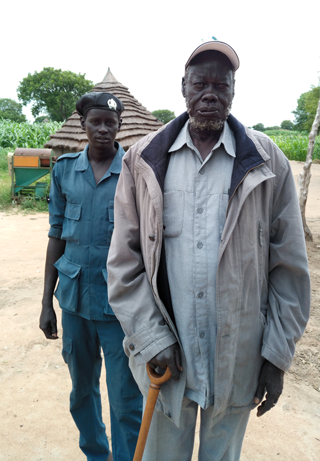RVI’s ongoing South Sudan Customary Authorities Project is seeking to deepen understanding of the changing role of chiefs and traditional authorities in South Sudan. As part of this project, RVI has trained a team of researchers in oral history to conduct research with customary authorities and their constituents in different parts of South Sudan, and with displaced communities outside its borders.
This Letter from Gogrial (former Warrap state) was written by Chirrilo Madut Anei, a young educated man from Gogrial. For Chirrilo, the research is an opportunity to learn from the chiefs about their role in the liberation struggle. As Chirrilo explains, ‘they are the unsung heroes of our liberation struggle in South Sudan in … that they provided the logistical support to the liberation army for nearly two and half decades. Yet now independence has been achieved, the chiefs believe that the government of the day has forgotten them.’
Chief Morris Ngor of the Buoyar Chiefdom (Western Dinka in South Sudan) is the oldest chief in the Apuk Dinka. He ascended to his position of communal power in 1973, when his father, who was also a chief, was killed by the Khartoum based regime because of his support to the liberation struggle of Anyanya I.1 Chief Morris’s forty-five years of service, his favour with the local titweng (armed cattle guards) and his savvy political decisions have made him one of the most powerful chiefs in the area.
Chief Morris had attended formal schooling in his childhood alongside pupils who would go on to occupy some of the most senior offices in South Sudan. As a chief, new NGO workers often approached him about various projects. When NGO workers came, he would surprise them with his clearly spoken English, or allow a translator to speak so that he could silently mock their assumptions about his lack of education.
 When the SSCA oral history interviews were planned, it was easy to imagine walking to his home and interviewing Chief Morris. The chief’s home used to be about a fifteen-minute walk from the Mayen Rual market, across the large marrum road that brought goods and people from Wau. At this time of year, just before the harvest, you approached his house through an extended maze of sorghum stalks that grow high above your head.
When the SSCA oral history interviews were planned, it was easy to imagine walking to his home and interviewing Chief Morris. The chief’s home used to be about a fifteen-minute walk from the Mayen Rual market, across the large marrum road that brought goods and people from Wau. At this time of year, just before the harvest, you approached his house through an extended maze of sorghum stalks that grow high above your head.
On any given morning, you could be almost certain to find him sitting outside one of his three large tukals (thatched huts) reclining on his large, wooden chair strung with goatskin. A small collection of chickens and goats would wander past him. Small groups of people from his chiefdom would weave their way through the sorghum fields to petition him or seek his counsel in the privacy of his home. His authority rested partly on his constant availability to the people he governed.
However, by July 2017, there were no more mornings spent on the goat skinned chair. In mid 2016, deadly conflict had re-erupted between the Apuk Dinka and their neighbours including the Kuac and Aguok Dinka. This continued into 2017. Chief Morris was a prime target of the armed violence and could no longer stay at home. The chief, like many people at the time, would move to a new hideout each day in fear of being killed.
The task of interviewing Chief Morris fell to me. I was from the neighbouring chiefdom and had known Chief Morris all my life. But I knew, for him, I would be no more than an anonymous young man from the neighbouring chiefdom. I had still imagined that I would be able to just walk to his house to speak to him—the open access that chiefs offer extends to those beyond their chiefdom. Yet, now, in this new situation of war, finding and securing time with Chief Morris would prove very challenging. Despite being a man of the people, the threats on his life forced him into hiding.
To access Chief Morris, I tried to send a cousin to approach him to ask for a meeting, but Chief Morris could not be found. Finally, I engaged somebody that Chief Morris trusted to approach him and ask for a meeting. Chief Morris finally agreed.
When we finally met we sat beneath a tree outside his official office in Mayen Rual. We sat near the phone network mast and surrounded by many armed policemen only a few metres away for his protection. Despite being a market, the place was quiet apart from my questions and Chief Morris’s answers. It was as if the whole chiefdom seemed to be listening as their chief spoke. I also felt like one of his people, being taught by Chief Morris’ words.
Notes
1. For more on South Sudan’s history, see RVI Fellow, Douglas Johnson’s new book, South Sudan. A New History for a New Nation.



